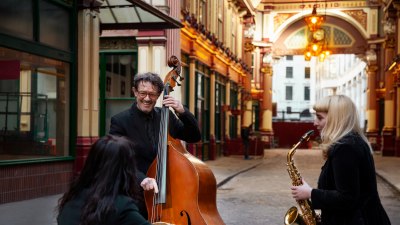What It’s Like to Travel Without a Phone for a Week
Could you survive a trip without Google Maps, instant messages, or social media? Here’s what happens when you unplug completely while traveling.

This image was created with the assistance of DALL·E
For most travelers, a phone is a lifeline. It helps with navigation, booking hotels, translating languages, and capturing every moment. But what if you left it behind for an entire trip? No maps, no social media updates, no instant searches. It sounds impossible in today’s world, but traveling without a phone can be one of the most liberating experiences you’ll ever have. Here’s what happens when you take a trip completely unplugged.
Everything Feels More Present
Without a phone, you stop looking down at a screen and start looking up at the world. You notice details you’d usually miss—how the light changes in the afternoon, the way locals interact, the sounds of a city waking up. Instead of reaching for your phone every time there’s a pause in activity, you just exist in the moment.
Without the distraction of notifications, you absorb places more deeply. A café isn’t just a Wi-Fi stop—it’s a space to watch life happen around you. A train ride becomes a time for reflection, not endless scrolling. You become more engaged in everything around you.
Navigation Becomes an Adventure
Google Maps makes travel easy, but it also takes away the fun of getting lost. Without a phone, you have to rely on old-school methods—asking locals for directions, reading actual maps, or simply wandering until you find what you’re looking for.
At first, it’s frustrating. You’ll make wrong turns, take longer to find places, and feel a little lost at times. But then something shifts. You start paying more attention to landmarks, remembering street names, and trusting your instincts. And when you finally reach your destination, it feels like a victory instead of just another checkmark on an itinerary.
Conversations Become More Meaningful
Without the option to message people instantly, you rely on face-to-face conversations. You ask strangers for recommendations instead of reading online reviews. You interact more with travel companions, rather than staring at your own separate screens. Even solo travel feels less isolating because you’re more open to engaging with those around you.
Language barriers? They become fun instead of frustrating. You use gestures, smiles, and simple words to communicate instead of relying on translation apps. It makes every interaction more personal and memorable.
Photography Feels Different
One of the biggest changes? No instant photos. You can’t snap a hundred shots, edit them, and post them online in seconds. Instead, you rely on a physical camera (or no camera at all), which makes you more selective about what you capture.
Without the pressure to document everything, you actually see more. You remember moments because you lived them fully, not because you took a picture for Instagram. And when you do take photos, they feel more intentional and meaningful.
You Learn to Trust Yourself
Without a phone, there’s no instant safety net. No quick Google search to solve a problem. No immediate contact with friends and family. You have to rely on your own judgment, problem-solving skills, and resourcefulness.
It can be uncomfortable at first, but then you start realizing how capable you are. You navigate new places on your own. You make decisions without second-guessing. You adapt when things don’t go as planned. The confidence boost that comes from figuring things out without a phone is one of the best parts of the experience.
The Verdict: It’s Hard—But Worth It
Traveling without a phone feels strange at first. You’ll instinctively reach for it, feel frustrated when you can’t check something instantly, and wonder if you’re missing out. But after a few days, something shifts. You feel lighter, more present, more connected to the world around you.
Is it practical for every trip? Maybe not. But even if you don’t ditch your phone completely, try using it less. Keep it in your bag instead of your pocket. Go a day without checking social media. Get lost on purpose. The less you rely on a screen, the more you’ll experience the world around you. And that’s what travel is really about.











